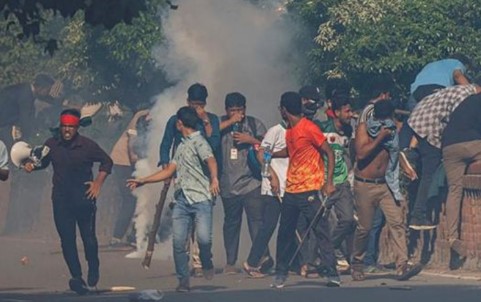Sheikh Hasina’s tenure as Prime Minister of Bangladesh, spanning two decades and two separate terms, is facing its most severe crisis yet with ongoing protests claiming over 300 lives. The violence reached a new peak when police deployed tear gas and rubber bullets against crowds demanding Hasina’s resignation, resulting in at least 98 deaths and hundreds of injuries, on Sunday.
This day of unrest has become one of the deadliest in recent Bangladeshi history, surpassing the 67 fatalities reported on July 19 during student protests against the government’s quota system for jobs.
What Triggered the Violent Unrest?
The protests, which began late last month, intensified dramatically when student activists from Dhaka University clashed with police and pro-government groups. The unrest is rooted in a contentious quota system, which reserves up to 30 per cent of government jobs for relatives of veterans from Bangladesh’s 1971 independence war against Pakistan.
Critics argue that this system is discriminatory and disproportionately benefits supporters of Hasina’s Awami League party. They are calling for the replacement of this system with a merit-based approach.
The quota system, initially established in 1972 and briefly abolished in 2018 before being reinstated, has been a persistent point of contention. Detractors claim it unfairly advantages Awami League supporters and limits opportunities for other qualified individuals. PM Hasina’s comments exacerbated tensions, fueling the protests further.
The demonstrations have expanded beyond the quota issue into a broader anti-government movement, attracting support from various sectors, including celebrities, musicians, and garment manufacturers. Social media campaigns and rap songs have amplified calls for Hasina’s resignation.
Government Response & Escalation
Hasina, who has been in power since 2009 and secured a fourth consecutive term in January through a controversial election boycotted by the Bangladesh Nationalist Party, faces accusations of consolidating power through state institutions and stifling dissent. The recent violence underscores mounting public frustration and demands for change.
The protesters have initiated a “March To Dhaka” today, leading to widespread attacks on public and government properties. In 39 districts, Awami League offices, police stations, and other installations were targeted, vandalised, and set ablaze. Properties of ruling party ministers and Awami League leaders were attacked in at least 14 locations.
In response, the government has imposed an indefinite nationwide curfew starting at 6 pm on Sunday, marking the first such measure in the current wave of protests. A three-day general holiday has also been declared, and internet services have been shut down.
Demonstrators have blocked major highways and launched a non-cooperation program, escalating nationwide violence. Police stations and ruling party offices have become targets, with severe clashes and significant casualties reported. Thirteen police officers were killed in Sirajganj, and the homes of two lawmakers were set on fire.
Spread of Unrest
The violence is not confined to Dhaka; it has spread throughout the country. In Munsiganj, two construction workers were killed and 30 others injured during clashes involving protesters, police, and ruling party activists. Additional clashes in Pabna, Feni, Lakshmipur, Narsingdi, Rangpur, Magura, and other districts have resulted in more casualties.
In Dhaka, a hospital was vandalised and four garment factories were burned. The government’s decision to cut off high-speed internet and social media platforms exacerbated the chaos.
Bangladesh’s telecom providers were instructed to shut down 4G services, effectively disabling internet access. Although the protests briefly subsided after the Supreme Court’s decision to eliminate most quotas, they have resumed sporadically, with continued demands for justice for those killed.
Chief of Army Staff General Waker-Uz-Zaman has directed officers to ensure the protection of lives, properties, and state installations. Despite these measures, protesters have continued to defy the curfew, resulting in further clashes and casualties.
The international community, including Bharat, has advised its nationals to avoid travel to Bangladesh amidst the ongoing unrest.

















